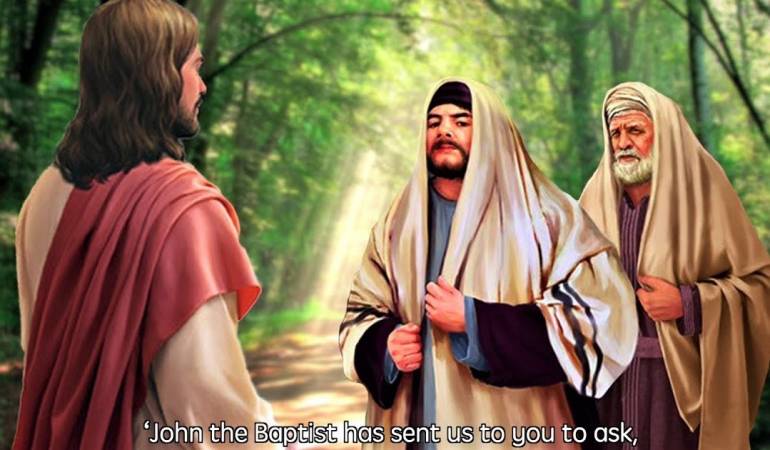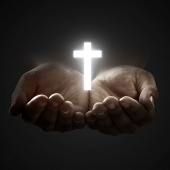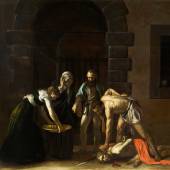And blessed is the one who takes no offense at me, (Matthew 11,2-11)

“Are you the one who is to come?”
A: The Text:Matthew 11,2-11
"When John heard in prisonof the works of the Messiah, he sent his disciples to him with this question, "Are you the one who is to come, or should we look for another?" Jesus said to them in reply, "Go and tell John what you hear and see: the blind regain their sight, the lame walk, lepers are cleansed, the deaf hear, the dead are raised, and the poor have the good news proclaimed to them. And blessed is the one who takes no offense at me." As they were going off, Jesus began to speak to the crowds about John, "What did you go out to the desert to see? A reed swayed by the wind? Then what did you go out to see? Someone dressed in fine clothing? Those who wear fine clothing are in royal palaces. Then why did you go out? To see a prophet?Yes, I tell you, and more than a prophet. This is the one about whom it is written: 'Behold, I am sending my messenger ahead of you; he will prepare your way before you.' Amen, I say to you, among those born of women there has been none greater than John the Baptist; yet the least in the kingdom of heaven is greater than he.”
B. Exegesis:
1. John the Baptist expected a fiery judgment from the Messiah. Remember the Gospel passage of last Sunday, Matthew 3,1-12.
“Repent, for the kingdom of heaven is at hand.” John the Baptist expected that the kingdom would be ushered in by a judgment in which sinners would be condemned and perish, as found in Jewish apocalyptic.
“He will baptize you with the holy Spirit and fire.” John expected an immersion of the repentant in the cleansing power of the Spirit of God and of the unrepentant in the destroying power of God’s judgment.
“His winnowing fan (i.e. a forklike shovel with which the threshed wheat was thrown into the air. The kernels fell to the ground. The light chaff, blown off by the wind, was gathered and burned up) is in his hand. He will clear his threshing floor and gather his wheat into his barn, but the chaff he will burn with unquenchable fire.” Just as a farmer separates wheat and chaff, the good and bad will be separated and judged accordingly.
John further spoke of “the coming wrath.” It is the judgment that will bring about the destruction of unrepentant sinners.
2. But Jesus’ mission has not been one of fiery judgment. Hence John the Baptist probably doubts that Jesus is the one who is to come: “Are you the one who is to come, or should we look for another?” which reflects Malachi 3,1: “Lo, I am sending my messenger to prepare the way before me …”
In the form of beatitude: “And blessed is the one who takes no offense at me”, Jesus warns him not to disbelieve, simply because his expectations have not been met.
3. Instead of fiery judgment, Jesus’ mission is marked by deeds of the time of salvation, foretold by the prophet Isaiah. Isaiah foretold the deeds of the messianic times:
- 26,19 “But your dead shall live, their corpses shall rise …” Here the prophet refers to the restoration of Israel in messianic times under the figure of the resurrection of the dead.
- 29,18-19: “On that day the deaf shall hear the words of a book; and out of gloom and darkness, the eyes of the blind shall see. The lowly will ever find joy in the Lord, and the poor rejoice in the Holy One of Israel.” The prophet presents God’s plan of redemption in terms of unheard of natural phenomena as if such changes in nature took place.
- 35,5-6: “Then will the eyes of the blind be opened, the ears of the deaf be cleared; Then will the lame leap like a stag, then the tongue of the dumb will sing”;
- 61,1: “… He has sent me to bring glad tidings to the lowly, to heal the brokenhearted, to proclaim liberty to the captives and release to the prisoners.” The prophet speaks of the restoration of Zion.
Now these deeds are accomplished by Jesus the Messiah: “the blind regain their sight, the lame walk, lepers are cleansed, the deaf hear, the dead are raised, and the poor have the good news proclaimed to them.”
As described in Matthew 8 – 9; a leper is cleansed, a centurion’s servant is healed, Peter’s mother-in-law is cured, the Gadarene demoniacs are healed, a paralytic is healed, the official’s daughter is resuscitated, the woman with a hemorrhage is cured, two blind men are healed, and a mute person is cured. Thus the messianic times foretold by the prophets have dawned; the ancient prophecies have come true; God has sent His Messiah to the people. He heals and exorcizes. He saves people instead of fiery judgment – beyond the expectation of John the Baptist.
C. Application:
4. Today we live in the period of God’s Kingdom, inaugurated by Jesus. We also live in the period of hope, expecting its culmination when Jesus comes again into our history. In this period, we have got to continue our faith-odyssey.
- Jews do not accept Jesus as the Messiah. They still live in the mentality of the Messiah of fiery judgment, shared in ancient times by Jewish apocalyptists and John the Baptist.
- Various Christian sects tarnish the true image of Jesus as the Messiah. For example, Jehovah Witnesses call Him the Archangel Michael.
- Down the centuries, novels have been written, films have been produced out of sheer imagination without any historical basis attempting to reduce His Messiahship to an ordinary family man of Nazareth. The fiction, Da Vinci Code, is not the first, the last and the only of this kind.
- For atheists, Jesus never existed or lived. For them, He is just a myth like Greco-Roman gods; a cocktail or retelling or copied form of the existing or preexisting mythologies concerning Mithras, Asclepius, Dionysus, Apollonius, Heracles and Horus.
The doubt-filled interrogative of John the Baptist reechoes across time and space – from time to time in this topsy-turvy world: “Are you the one who is to come, or should we look for another?” Hence our faith journey is really an odyssey, an expedition. We have begun it well, being bathed with the waters of Baptism. Let’s continue it letting the words of our Master ever ring in our ears “And blessed is the one who takes no offense at me.”
LOGOS Ministry:
Motto: ἡμεῖς δὲ τῇ προσευχῇ καὶ τῇ διακονίᾳ τοῦ λόγου προσκαρτερήσομεν.
“And we shall show steadfast strength towards the prayer and the service of the Word” (Acts 6,4)
E-Sunday Word Ministry
Radio Veritas Asia (RVA), a media platform of the Catholic Church, aims to share Christ. RVA started in 1969 as a continental Catholic radio station to serve Asian countries in their respective local language, thus earning the tag “the Voice of Asian Christianity.” Responding to the emerging context, RVA embraced media platforms to connect with the global Asian audience via its 21 language websites and various social media platforms.













